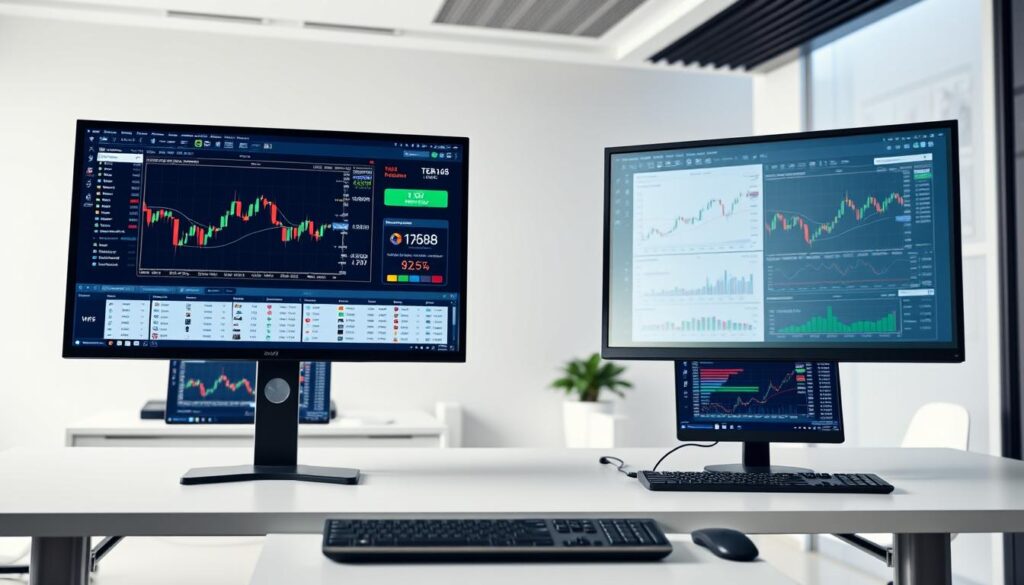Electronic foreign exchange execution, or EFX, revolutionizes how currencies are traded. It combines algorithmic strategies with institutional-grade liquidity to streamline transactions. This modern approach has replaced many traditional forex methods, offering faster and more efficient trades.
Today, EFX accounts for nearly 90% of global FX market activity. The Bank for International Settlements confirms this shift in their 2022 report. Advanced technology enables real-time pricing and low-latency execution, making it essential for financial institutions.
Key components include multibank portals and automated systems. These tools help corporate treasuries and investors access better rates. The market benefits from increased transparency and reduced costs through electronic execution.
Understanding these strategies provides valuable insights into modern finance. The foreign exchange landscape continues evolving with technological advancements. This section explores how EFX works and why it matters in today’s economy.
Understanding EFX Trading: A Comprehensive Definition
Modern currency markets rely on electronic execution for speed and efficiency. Known as Electronic Foreign Exchange (EFX), this system replaces outdated phone-based deals with algorithmic strategies. It connects institutions to real-time pricing and deep liquidity pools.
What Does EFX Trading Stand For?
EFX stands for Electronic Foreign Exchange execution. It aggregates rates from multiple banks, like Westpac, across Sydney, London, and New York. This ensures transparency and competitive pricing for traders.
How EFX Trading Differs from Traditional Forex
Traditional forex relied on phone negotiations and delayed settlements. EFX streamlines this with:
- Algorithmic routing: Orders execute in under 1 millisecond.
- 24-hour processing: Faster than the T+2 timeline of legacy systems.
- Platform integration: FXALL and Bloomberg consolidate liquidity.
Banks like Westpac offer 5.5-day coverage, ensuring uninterrupted access to global markets. This shift reflects the demand for speed and reliability in currency exchange.
Why EFX Trading Matters in Global Markets

Global financial markets increasingly depend on advanced electronic solutions for currency transactions. These systems offer unmatched speed, transparency, and cost efficiency, reshaping how institutions engage with forex.
Key Benefits for Traders and Institutions
Electronic execution slashes costs with spreads as low as 0.2–1.5 pips, compared to 3–5 pips in manual systems. Clients access real-time pricing, reducing delays and improving decision-making.
Westpac’s co-location in Equinix NY4 ensures low-latency connectivity. This infrastructure supports high-volume trades with minimal slippage, critical for hedge funds and corporate treasuries.
The Role of Competitive Pricing and Liquidity
Platforms aggregate $50B+ in daily executable volumes, providing deep liquidity. Iceberg orders and dark pools further minimize market impact for large trades.
Hong Kong serves as Asia-Pacific’s forex hub, leveraging its time zone to bridge global sessions. Westpac’s benchmark execution here meets institutional demand for precision and reliability.
Effective EFX Trading Strategies for Success

Mastering currency markets requires smart execution strategies. Institutions rely on algorithmic tools to reduce costs and improve precision. These methods cater to high-volume traders seeking competitive edges.
Algorithmic Execution and Market Impact
TWAP (Time-Weighted Average Price) and VWAP (Volume-Weighted Average Price) strategies slice orders to avoid price disruption. Westpac’s systems analyze liquidity pools in real time, optimizing entry points.
Pre-trade cost tools forecast fees and slippage. Multi-bank price streams ensure clients access the tightest spreads. Automated stops trigger in under 100ms, protecting against sudden swings.
Risk Management Techniques
Westpac’s Online FX platform lets institutions manage settlement instructions (SSIs) dynamically. Real-time alerts flag unusual volatility, enabling swift adjustments.
For large trades, iceberg orders hide volume to prevent market impact. These tactics balance speed with discretion, critical in Hong Kong’s fast-paced sessions.
Top EFX Trading Platforms and Tools

Financial institutions now leverage advanced platforms to optimize currency transactions. These solutions provide real-time pricing, deep liquidity, and seamless integration with treasury workflows. Selecting the right system ensures cost efficiency and execution precision.
Comparing Multibank Portals and Proprietary Systems
FXALL dominates with $80B daily liquidity, ideal for large-volume trades. Its multibank aggregation offers transparency across 50+ liquidity providers. Competitor 360T excels in ETF integration, catering to asset managers.
Westpac’s proprietary platform, Online FX, automates net settlements and SSI management. API connectivity services link it to enterprise treasury systems, reducing manual errors.
Features of Leading Platforms
Bloomberg FXGO streamlines trader workflows with pre-trade analytics. SWIFT GPI integration enables real-time settlement tracking, critical for Hong Kong’s fast-paced market.
For institutions, platforms like Currenex offer algorithmic execution. Iceberg orders and dark pools minimize market impact, aligning with Westpac’s low-latency infrastructure.
Navigating EFX Trading in Hong Kong’s Dynamic Market
Asia’s leading forex center leverages connectivity for global business. The HKD-USD peg ensures stability, while offshore RMB pools offer deep liquidity. Westpac’s dealing desk provides expertise in both currencies, crucial for institutional execution.
Hong Kong bridges Asian and world trading hours, creating seamless currency flows. HKMA regulations enhance settlement efficiency, reducing risks for multinational corporations. Real-time pricing feeds and algorithmic tools optimize execution during peak overlaps.
Family offices benefit from Hong Kong’s distribution networks and regulatory advantages. Strategic positioning allows high-net-worth investors to access both local and global business opportunities. This ecosystem delivers precision for complex cross-border transactions.



